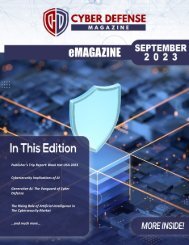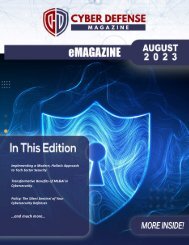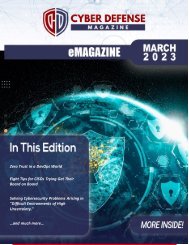Cyber Defense eMagazine July 2020 Edition
Cyber Defense eMagazine July Edition for 2020 #CDM #CYBERDEFENSEMAG @CyberDefenseMag by @Miliefsky a world-renowned cyber security expert and the Publisher of Cyber Defense Magazine as part of the Cyber Defense Media Group as well as Yan Ross, US Editor-in-Chief, Pieruligi Paganini, Co-founder & International Editor-in-Chief, Stevin Miliefsky, President and many more writers, partners and supporters who make this an awesome publication! Thank you all and to our readers! OSINT ROCKS! #CDM #CDMG #OSINT #CYBERSECURITY #INFOSEC #BEST #PRACTICES #TIPS #TECHNIQUES
Cyber Defense eMagazine July Edition for 2020 #CDM #CYBERDEFENSEMAG @CyberDefenseMag by @Miliefsky a world-renowned cyber security expert and the Publisher of Cyber Defense Magazine as part of the Cyber Defense Media Group as well as Yan Ross, US Editor-in-Chief, Pieruligi Paganini, Co-founder & International Editor-in-Chief, Stevin Miliefsky, President and many more writers, partners and supporters who make this an awesome publication! Thank you all and to our readers! OSINT ROCKS! #CDM #CDMG #OSINT #CYBERSECURITY #INFOSEC #BEST #PRACTICES #TIPS #TECHNIQUES
Create successful ePaper yourself
Turn your PDF publications into a flip-book with our unique Google optimized e-Paper software.
Donation Solicitations - The Most Dangerous COVID-19 Phishing Scam<br />
Global pandemics like COVID-19 bring out the humanitarian side of people in a substantial way.<br />
Generally, people donate generously towards their respective National Disaster Relief Funds, and<br />
research funds set up by their governments. There have been numerous incidents of cybercriminals<br />
taking advantage of such philanthropic activities. One of the most notorious modus operandi is to design<br />
fundraising pages that not only mislead users into donating money but also steal sensitive personal<br />
information. Using such information, like names, email addresses, phone numbers, credit card details,<br />
and internet banking usernames and passwords, these malicious actors accept money using the names<br />
of disaster relief funds.<br />
COVID-19 Vaccine and Cure Scam - The Most Ingenious COVID-19 Phishing Attack<br />
While researchers are struggling to find an antidote for the coronavirus, numerous fake websites<br />
advertising medicines and vaccines have sprung up on the internet. More than 20,000 new COVID-19-<br />
related domains have been registered in the past few weeks. These websites also claim to sell COVID-<br />
19 personal protective kits like face masks, sanitizers, hand gloves, medical combinations like<br />
Hydroxychloroquine, Remdesivir, and so on. Such fraudulent websites ask for the full payment in<br />
advance and unsuspecting people end up parting with their money only to discover that they have been<br />
a victim of cybercrime. Amazon itself reported over a million fake products in this category over the past<br />
couple of months.<br />
Detective, Preventive and Protective Measures Individuals & Enterprises Can Adopt<br />
<strong>Cyber</strong>criminals play on the psychology of the victim by pushing in email messages with COVID-19 related<br />
information that come along with a malicious attachment or infectious URL. Knowing some of these<br />
threats could be the best defense in thwarting such attempts:<br />
• Reliance on Trusted Sources: Rely on authentic or official websites to get reliable information and<br />
updates about the coronavirus. Be scrupulous in clicking on the links provided on articles and<br />
blogs that share information on COVID-19.<br />
• Refrain from The Temptation To Click/Download: Sometimes, ignoring unsolicited emails is the<br />
best phishing prevention method. Downloading or opening malicious attachments or clicking on<br />
an infectious URL allows malicious actors to gain access to network systems.<br />
• Knowing the Phishing Techniques: The latest tactic deployed by malicious actors is to set up live<br />
tracker websites from which people can purportedly get live coronavirus updates. Though the<br />
websites appear legitimate, they are scamming attempts that end up with the user compromising<br />
their confidential information.<br />
• Phishing Protection Solutions: The best way to deal with phishing threats is to install a trusted<br />
anti-phishing solution to thwart any attempt made by adversaries.<br />
<strong>Cyber</strong> <strong>Defense</strong> <strong>eMagazine</strong> –<strong>July</strong> <strong>2020</strong> <strong>Edition</strong> 115<br />
Copyright © <strong>2020</strong>, <strong>Cyber</strong> <strong>Defense</strong> Magazine. All rights reserved worldwide.


















